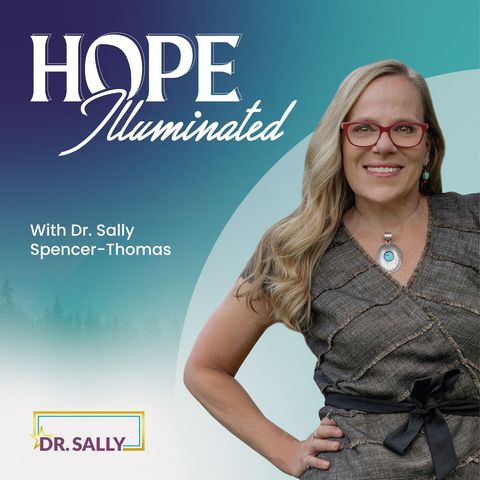"Why Would God Do This?" -- Faith, Religion and Suicide: Interview with Dr. Melinda Moore | Episode 40

Jul 23, 2019 ·
57m 32s
Faith community leaders are often first responders after a suicide death. Sometimes, as in my family’s situation, faith leaders do an amazing job in supporting a highly traumatized and confused...
show more
Faith community leaders are often first responders after a suicide death. Sometimes, as in my family’s situation, faith leaders do an amazing job in supporting a highly traumatized and confused family through their grief journey and facilitate a memorial service that both honors the life that was lived without shying away from the tragedy of suicide. Other times families feel compounded shame and guilt and experience additional layers of loss because of how faith leaders address suicide. Faith beliefs are sometimes shattered in the aftermath of suicide, and anger at God is not uncommon.
https://theactionalliance.org/faith-hope-life
https://theactionalliance.org/faith-hope-life
From a suicide prevention standpoint, faith communities can foster compassion and support for people who are experiencing hardship, and can use theological reflection to help people make meaning. They can also work closely with mental health resources in the community to build bridges and increase their mental health and suicide prevention literacy. When faced with intervening with someone they are worried about, faith leaders can be trained to expand their pastoral counseling skills to identify someone in an emerging suicide crisis and to help them build out their safety net. Should a suicide impact a faith community, faith leaders are often called upon to conduct memorial services and ofter pastoral care, and thus, would benefit greatly from understanding suicide grief and trauma and best practices in safe and effective messaging.
According to Dr. Melinda Moore, 85% of clergy know that helping people in a suicide crisis is part of their responsibility, but they don’t know what to do. In this interview with her, we explore some of the findings from a recently released guidelines from the National Action Alliance for Suicide Prevention called “Suicide Prevention Competencies for Faith Leaders: Supporting Life Before, During, and After a Suicidal Crisis.” We also discuss ways that faith communities can offer support through the National Weekend of Prayer and the resources offered through the “Faith-Hope-Life” campaign.
Melinda Moore headshot B&W.png
About Dr. Melinda Moore
Dr. Melinda Moore is an Assistant Professor in the Department of Psychology at Eastern Kentucky University in Richmond, Kentucky. She is in private practice in Lexington, Kentucky, and routinely trains clinicians in suicide-focused treatment. Dr. Moore serves on the board of the American Association of Suicidology as the chair of the Clinical Division and is the co-lead of the National Action Alliance’s Faith Communities Task Force. She recently published The Suicide Funeral: Honoring their Memory, Comforting their Survivors (Wipf & Stock) with her co-author Rabbi Dan Robert. She conducts suicide bereavement research at Eastern Kentucky University with an emphasis on Posttraumatic Growth (www.posttraumaticgrowth.com). She received her PhD from The Catholic University of America. For more information on this and every episode go to https://www.sallyspencerthomas.com/hope-illuminated-podcast/40
show less
https://theactionalliance.org/faith-hope-life
https://theactionalliance.org/faith-hope-life
From a suicide prevention standpoint, faith communities can foster compassion and support for people who are experiencing hardship, and can use theological reflection to help people make meaning. They can also work closely with mental health resources in the community to build bridges and increase their mental health and suicide prevention literacy. When faced with intervening with someone they are worried about, faith leaders can be trained to expand their pastoral counseling skills to identify someone in an emerging suicide crisis and to help them build out their safety net. Should a suicide impact a faith community, faith leaders are often called upon to conduct memorial services and ofter pastoral care, and thus, would benefit greatly from understanding suicide grief and trauma and best practices in safe and effective messaging.
According to Dr. Melinda Moore, 85% of clergy know that helping people in a suicide crisis is part of their responsibility, but they don’t know what to do. In this interview with her, we explore some of the findings from a recently released guidelines from the National Action Alliance for Suicide Prevention called “Suicide Prevention Competencies for Faith Leaders: Supporting Life Before, During, and After a Suicidal Crisis.” We also discuss ways that faith communities can offer support through the National Weekend of Prayer and the resources offered through the “Faith-Hope-Life” campaign.
Melinda Moore headshot B&W.png
About Dr. Melinda Moore
Dr. Melinda Moore is an Assistant Professor in the Department of Psychology at Eastern Kentucky University in Richmond, Kentucky. She is in private practice in Lexington, Kentucky, and routinely trains clinicians in suicide-focused treatment. Dr. Moore serves on the board of the American Association of Suicidology as the chair of the Clinical Division and is the co-lead of the National Action Alliance’s Faith Communities Task Force. She recently published The Suicide Funeral: Honoring their Memory, Comforting their Survivors (Wipf & Stock) with her co-author Rabbi Dan Robert. She conducts suicide bereavement research at Eastern Kentucky University with an emphasis on Posttraumatic Growth (www.posttraumaticgrowth.com). She received her PhD from The Catholic University of America. For more information on this and every episode go to https://www.sallyspencerthomas.com/hope-illuminated-podcast/40
Information
| Author | MHNRN, LLC |
| Website | - |
| Tags |
Copyright 2024 - Spreaker Inc. an iHeartMedia Company
